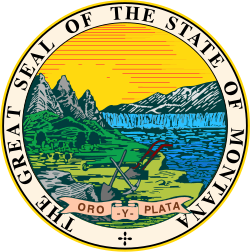November 2, 2004 | |||||||||||||||||
| |||||||||||||||||
 County results Rehberg: 40–50% 50–60% 60–70% 70–80% 80–90% >90% Velazquez: 40–50% 50–60% | |||||||||||||||||
| |||||||||||||||||
| Elections in Montana |
|---|
 |
The 2004 United States House of Representatives election in Montana were held on November 2, 2004, to determine who will represent the state of Montana in the United States House of Representatives. Montana had one, at large district in the House, apportioned according to the 2000 United States census, due to its low population. Representatives are elected for two-year terms.

